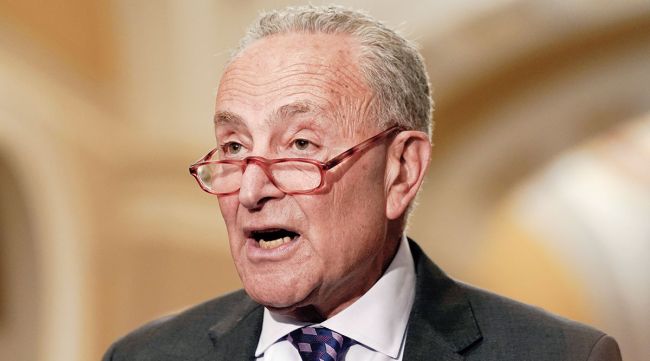Legislation to fund the U.S. Department of Transportation through fiscal 2024 will be considered in the Senate as early as the week of Sept. 11.
Sen. Chuck Schumer (D-N.Y.), the chamber’s leader, outlined a legislative schedule prioritizing the transportation funding measure along with funding bills for veterans programs and agriculture policy.
A fiscal 2024 funding bill approved by a Senate committee July 20 would dedicate $98.9 billion for the departments of Transportation and Housing and Urban Development. “We can summarize the Senate’s work in funding the government in one word: bipartisan,” Schumer told reporters on Capitol Hill on Sept. 6. Noting current funding authority for the federal government expires at the end of the month, Schumer added, “One of the Senate’s top priorities will be to keep the government open beyond the Sept. 30 deadline. Both parties in both chambers will have to work together if we are to avoid a shutdown.”

McConnell
During a separate meeting with reporters Sept. 6, Senate Republican Leader Mitch McConnell (R-Ky.) acknowledged a need to proceed with the consideration of funding legislation: “We have a lot of work to do in a very short period of time. We have to figure out how to fund the government past Sept. 30.”
The leadership of the Senate Appropriations panel, Sens. Patty Murray (D-Wash.) and Susan Collins (R-Maine), expressed optimism over ongoing efforts meant to garner bipartisanship specific to the fiscal 2024 funding process.
“We are pleased to announce we are working to move ahead with the first package of appropriations bills on the Senate floor as early as next week,” the senators said jointly Sept. 6. “This summer, we worked with our colleagues in a bipartisan way to draft and pass out of committee all 12 appropriations bills for the first time in years — and did so with overwhelming bipartisan votes.”

Murray (left) and Collins
“This is a critical next step as we continue working collaboratively in the Senate to keep our government funded, find common ground, and deliver for the people back home that we represent,” Murray and Collins added.
Specific to transportation agencies, the Senate funding bill would dedicate $20.2 billion for the Federal Aviation Administration, $16.8 billion for the Federal Transit Administration and $3.4 billion for the Federal Railroad Administration.
House leaders resume their legislative schedule Sept. 11. The House Appropriations Committee on July 18 approved its fiscal 2024 transportation bill. The House bill would dedicate $90.2 billion for the departments of Transportation and Housing and Urban Development. That would include $19.5 billion for the FAA, $14.6 billion for the FTA and $1.4 billion for the FRA. Per trucking policy, the House bill would deny funds for pursuing rules or regulations associated with equipping speed limiting devices on certain commercial vehicles.

Transport Topics’ Seth Clevenger, Michael Freeze and Mike Senatore dissect the new Top 100 list of the largest private carriers, including how fleets are adapting to this softened market. Tune in above or by going to RoadSigns.ttnews.com.
The House and Senate legislative versions would provide nearly $1 billion for the Federal Motor Carrier Safety Administration. The agency is tasked with overseeing trucking rules and regulations. Both bills also would prohibit requirements — such as inward-facing cameras — for enrolling in a pilot training program for truck drivers younger than 21.
At the White House on Sept. 6, press secretary Karine Jean-Pierre reminded reporters that congressional lawmakers are tasked with funding federal agencies and operations. As she put it, “Congress has a job to do. They need to keep the government open.”
President Joe Biden is requesting Congress approve a $16 billion supplemental disaster relief package as part of the appropriations process. The emergency funds would target recovery programs related to wildfires, floods and hurricanes. The White House also is seeking additional aid to assist Ukraine in the war with Russia.






